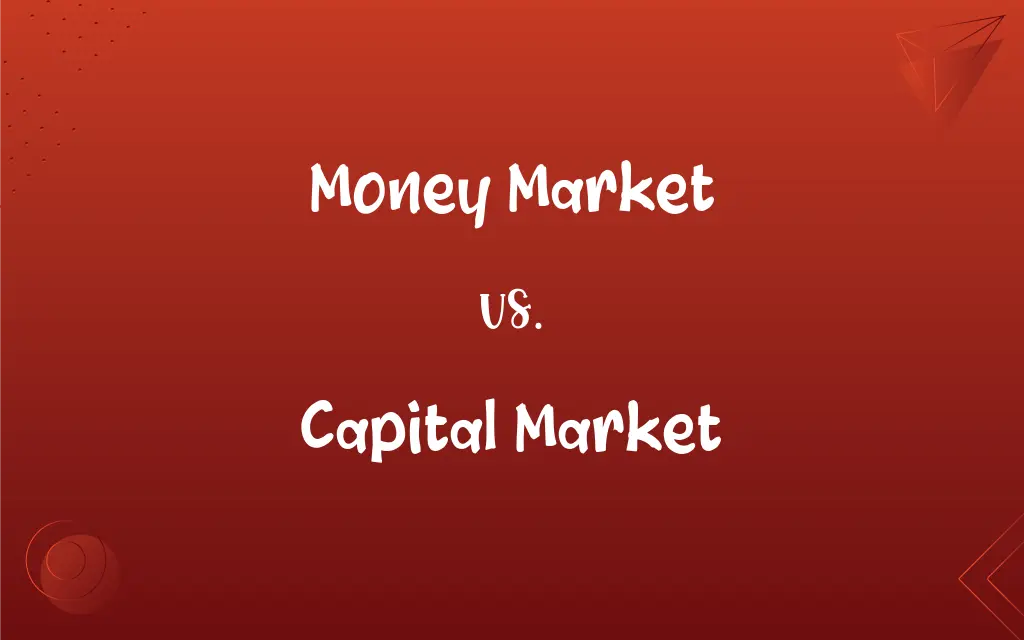Money Market vs. Capital Market: What's the Difference?
Edited by Aimie Carlson || By Harlon Moss || Updated on October 23, 2023
The money market deals with short-term debt instruments, while the capital market handles long-term investments like stocks and bonds.

Key Differences
The money market is a segment of the financial market where financial instruments with high liquidity and short maturities, typically one year or less, are traded. It is primarily utilized by governments, banks, and other large institutions to manage their short-term cash needs. Conversely, the capital market is where individuals and institutions trade financial securities with longer maturities, often exceeding a year.
Instruments commonly found in the money market include treasury bills, commercial paper, and certificates of deposit. These instruments are typically considered low risk, given their short maturity. On the other hand, the capital market includes more diverse instruments like stocks, bonds, and debentures, which carry varying levels of risk and return potential.
The money market tends to offer lower returns compared to the capital market because of its lower-risk nature. Investors looking for a safe place to park their money for a short duration might turn to the money market. Those seeking higher returns and willing to accept higher risk over a more extended period might look towards the capital market.
Another notable difference is the participants. The money market is generally more accessible to institutional players, whereas the capital market is open to both retail and institutional investors. Both markets, however, play a crucial role in ensuring that resources are efficiently allocated in the economy.
In summary, while both the money market and capital market serve as platforms for borrowing and lending, they cater to different financial needs and time horizons, and thus, they attract different types of investors and instruments.
ADVERTISEMENT
Comparison Chart
Duration
Short-term (up to 1 year)
Long-term (more than 1 year)
Instruments
Treasury bills, commercial paper
Stocks, bonds, debentures
Return Potential
Generally lower
Higher, depending on risk
Risk
Typically lower
Varies, can be higher
Participants
Mostly institutional
Both retail and institutional investors
ADVERTISEMENT
Money Market and Capital Market Definitions
Money Market
A financial market for short-term borrowing and lending.
Banks often turn to the money market to manage their short-term liquidity needs.
Capital Market
A platform facilitating the buying and selling of long-duration assets.
Bond issuance, a common occurrence in the capital market, helps companies secure long-term financing.
Money Market
A market where institutions handle short-term monetary needs.
When facing a temporary cash crunch, companies might seek funds in the money market.
Capital Market
Where institutions and individuals trade in longer-term financial instruments.
Investors with a long-term horizon might look for opportunities in the capital market.
Money Market
The go-to place for low-risk, short-term investments.
To safeguard their principal amount, conservative investors might opt for money market instruments.
Capital Market
A financial market for long-term securities like stocks and bonds.
Start-ups often raise funds in the capital market to finance their expansion.
Money Market
A segment trading in highly liquid, short-duration instruments.
Treasury bills, a staple in the money market, are considered low-risk investments.
Capital Market
The segment of the financial market targeting long-term investment needs.
To diversify their portfolio, investors often delve into the capital market.
Money Market
A platform offering instruments with maturities up to one year.
Investors seeking short-term parking spots for their cash often explore the money market.
Capital Market
Where businesses raise long-term funds through securities issuance.
The capital market plays a pivotal role in driving economic growth by allocating resources efficiently.
FAQs
Which market is generally considered riskier?
The capital market can be riskier due to the longer-term nature and diversity of instruments.
Which market deals with short-term financial instruments?
The money market deals with short-term financial instruments.
Can individual investors participate in the money market?
While the money market is primarily for institutional players, individuals can access it through money market funds.
Are stocks typically found in the capital market or money market?
Stocks are typically found in the capital market.
Is the money market only for banks?
While banks are major players, other institutions also participate in the money market.
Is the money market affected by central bank policies?
Yes, the money market is highly sensitive to central bank policies, especially interest rate changes.
Which market aids in the economic growth of a country?
Both play roles, but the capital market significantly aids in economic growth by facilitating long-term investments.
Are money market investments liquid?
Yes, money market instruments are typically highly liquid due to their short-term nature.
Which market usually offers higher returns?
The capital market generally offers higher returns, depending on the risk.
Which market deals with the issuance of bonds?
Bonds are issued in the capital market.
Are commercial papers traded in the capital market?
No, commercial papers are short-term instruments traded in the money market.
Can an individual directly buy a treasury bill?
Individuals can usually buy treasury bills through government auctions or indirectly via financial institutions.
What's a common instrument in the money market?
A common instrument in the money market is the treasury bill.
Can businesses raise long-term financing in the money market?
No, businesses typically raise long-term financing in the capital market.
Are returns in the money market usually fixed?
Returns in the money market are often more predictable but can vary.
Do mutual funds operate in the capital market?
Yes, mutual funds buy and sell securities in the capital market.
How does the capital market support businesses?
The capital market provides businesses access to long-term funds, aiding in expansion and operational needs.
What's the primary goal of participants in the capital market?
Participants in the capital market generally seek longer-term capital appreciation and investment returns.
Why might a company choose to issue bonds in the capital market?
Companies might issue bonds in the capital market to secure long-term financing.
Can an investor buy stocks in the money market?
No, stocks are traded in the capital market.
About Author
Written by
Harlon MossHarlon is a seasoned quality moderator and accomplished content writer for Difference Wiki. An alumnus of the prestigious University of California, he earned his degree in Computer Science. Leveraging his academic background, Harlon brings a meticulous and informed perspective to his work, ensuring content accuracy and excellence.
Edited by
Aimie CarlsonAimie Carlson, holding a master's degree in English literature, is a fervent English language enthusiast. She lends her writing talents to Difference Wiki, a prominent website that specializes in comparisons, offering readers insightful analyses that both captivate and inform.































































